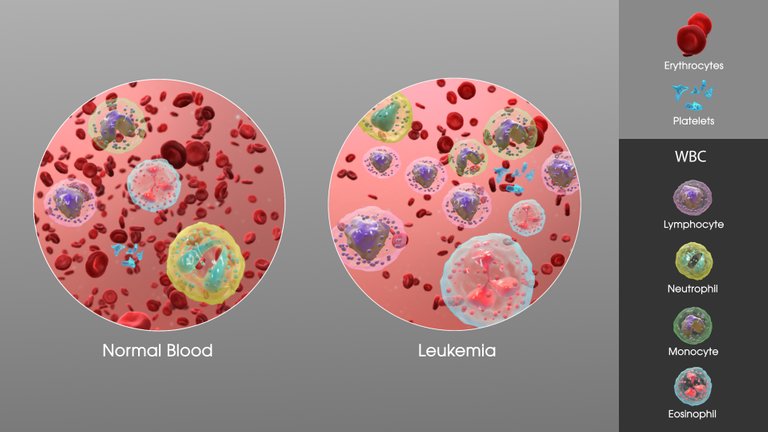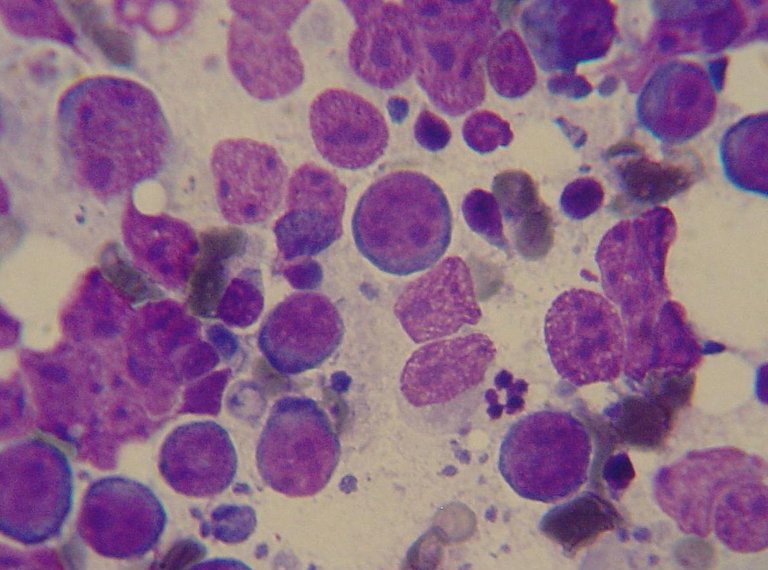Hello Everyone!
A cordial greeting to the entire #Steemstem community.
Today I bring you a topic about a blood disease that is giving something to talk about in recent years, acute infoblastic leukemia. I will make an exact summary and for the understanding of all of you. The knowledge of the biology of ALL and the use of both molecular targets and immunotherapy make us consider a very promising future in this disease.
Before starting, we should know that leukemias have neoplastic processes that begin to originate in the cells of the bone marrow. (It's a cancer)
Let's start

Acute Lymphoblastic Leukemia
The lymphoblastic leukemias are part of the neoplasms that are frequent in the pediatric age. It is estimated that acute lymphoblastic leukemia accounts for 75% of all acute leukemias for the youngest. At this time, the etiology is unknown. According to the studies carried out, there are genetic, viral and environmental factors.
Acute lymphoblastic leukemia has a very rapid increase in lymphoblasts in the person suffering, these lymphoblasts can not evolve to mature lymphocytes so they are incompetent when it comes to defending the person from infections, this makes normal cells The marrow decreases in red blood cells, platelets and normal white blood cells, which results in anemia, possible bleeding and infections.
Characteristics
Acute lymphoblastic leukemia can be classified differently. The one that should be used today distinguishes leukemias according to the stage of maturation of their precursors.
- ALL type 1: it is the most frequent (82% of ALL) and with a better presicion, since its response to treatment is excellent. It is the most common in children 3 to 7 years old. The extramedullary infiltrative involvement that occurs in this type of leukemia is moderate, including lymphadenopathy and hepatosplenomegaly.
- ALL type 2: it is the second in frequency (15%), it has a male affectation, it occurs more frequently at ages over 10 years. It is associated with a more acute evolution, which can become an oncological emergency, because it can generate massive adenopathies in the anterior and superior mediastinum, being able to generate and acute respiratory insufficiency.
- ALL type 3: it is the least frequent and it is also the worst prognosis. Represents approximately 3% of the types of ALL, has no predilection for any sex and it usually occurs in patients under 13 years of age. It has a much faster cell generation time and is associated with systemic adenopathies and massive hepatomegaly and splenomegaly.
Causes
ALL arises when a single lymphoblast obtains many mutations of genes that affect the development and proliferation of blood cells. In childhood ALL, this process begins at conception with the inheritance of some of these genes. These genes, in turn, increase the risk of more mutations occurring in the development of lymphoid cells.
Until now, doctors do not know what their cause is, so it is not possible, to date, to avoid it.
- Genetic factors, that is, alterations of the chromosomes that predispose to the appearance of these diseases.
- Be exposed to X-rays before birth.
- Being exposed to ionizing radiation, as in the case of high-dose radiation therapy or exposure to uncontrolled nuclear radiation.
- Certain chemical substances, such as benzene, alkylating substances, nitrosoureas or chloramphenicol.
- Having had previous treatment with chemotherapy.
- Infections by some types of virus, specifically certain retroviruses.
Have certain genetic conditions, such as the following
- Down's Syndrome.
- Neurofibromatosis type 1.
- Bloom syndrome.
- Fanconi anemia.
- Ataxia-telangiectasia
- Li-Fraumeni syndrome.
Relevant Information: immunotherapy based on cell therapy

This could be an advance in the treatment of ALL that is occurring today in CAR T cells (T cells modified with chimeric receptor antigen), with specificity for CD19. CAR-T cells are T-lymphocytes from the patient to which, after performing an apheresis of the patient, they are induced to express on their surface a chimeric antigen receptor having an anti-CD19 antibody bound to an intracellular signal domain in the lymphocyte T. In addition, they have a CD28 costimulator domain. Once the lymphocytes are infused into the patient, this co-stimulatory domain activates the T lymphocyte to attack the CD19 + leukemic cells.
Conclusion
Patients with ALL require attention, including rapid treatment of metabolic or infectious complications, such as the administration of derivatives of blood products.
Another important point for the care of these patients is the use of catheters, reduction of nausea and vomiting, pain control and psychological support for the patient and his family.
The prognosis of children with ALL has improved in recent decades thanks to a series of new drugs and treatments adapted to the risk of patients. Currently, the overall cure rate of ALL is close to 90% of patients in developed countries.
Reference
https://www.nejm.org/doi/full/10.1056/NEJM199808273390907
https://www.sciencedirect.com/science/article/pii/S0031395516338512
https://en.wikipedia.org/wiki/Acute_lymphoblastic_leukemia
Thank you for taking the time to read this publication. I hope you have a happy day, see you in the next. Do not forget to leave a comment about what you thought, thank you very much.@vanecsamusic


Had a little fright a few years ago when after a routine evaluation there was a suspicion of something like this in one of my family members.
Become an expert in 24 hours. It was just a fluke test result as the evaluation was repeated and the test results came back normal (CD counts were normal).
But the knowledge stayed in my mind and I researched more about the subject. I still recognize the terminology to this day :D
Congratulations @vanecsamusic! You received a personal award!
Click here to view your Board
Do not miss the last post from @steemitboard:
Congratulations @vanecsamusic! You received a personal award!
You can view your badges on your Steem Board and compare to others on the Steem Ranking
Do not miss the last post from @steemitboard:
Vote for @Steemitboard as a witness to get one more award and increased upvotes!